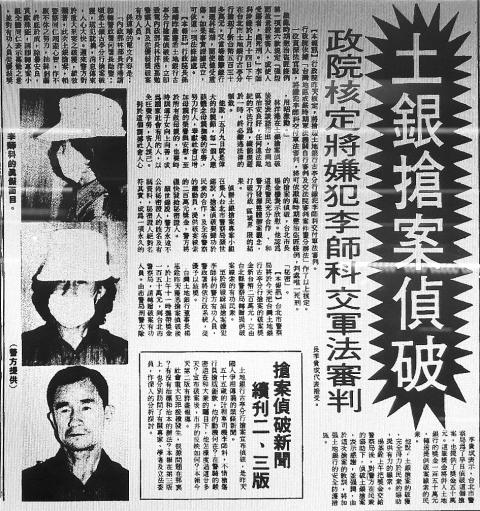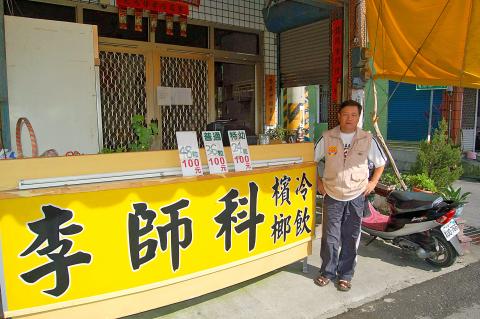April 10 to April 16
A golden statue of Lee Shih-ke (李師科), looking harmless with his hands on his hips, stands watch as a “door god” under a corrugated metal roof outside a small shrine in the mountains of New Taipei City’s Sindian District (新店).
Taiwan is full of figures whose reputations have drastically reversed over time — but it is still quite incredulous that the country’s first gunpoint bank robber, who also admitted to murder, is still worshipped as a “righteous bandit” to this day.

Photo: Han cheung, Taipei Times
THE HEIST
On April 14, 1982, the 55-year-old military veteran entered the state-owned Land Bank of Taiwan’s Guting branch in Taipei and brandished the .38 revolver he had obtained two years earlier by murdering a special police officer. Lee was wearing a wig, baseball cap and a sanitary mask.
He reportedly yelled, “This money belongs to the country, but your life belongs to you,” and demanded NT$10 million (about US$326,000 at the current exchange rate). He ended up shooting and injuring the assistant branch manager, who did not heed his warnings to back off, and made off with about NT$5.3 million.

Photo: Lee Li-fa, Taipei Times
The heist was plastered all over the front pages of the newspapers, as it was something unheard of in those times. It was partially recorded by security cameras and shown on television.
“If the television news did not state that this happened in Taipei, we could have mistaken it for a commercial for an American Western film,” the United Daily News printed. “We would never imagine that this was a real person with a real gun ...”
Before Lee was caught less than a month later, the police first apprehended Wang Ying-hsien (王迎先). They forced a confession out of him, but Wang allegedly committed suicide by jumping into a river while feigning to lead the police to the weapon and cash.

Photo courtesy of Wikimedia Commons
A few hours after Wang’s death, Lee was caught. He confessed to the crime right away as well as admitting to killing the police officer two years earlier. He explained in detail his motives and how he pulled the heist off to reporters, stating that he had visited the bank several times and had already planned out his escape route. He stored NT$4 million at a friend’s house, while keeping the rest in his apartment.
Lee told United Daily News reporters that he robbed the bank because he was unhappy with the way society was developing. He detested the “noveau riche” and financial criminals and wanted to make a statement.
However, when pressed further about why he needed so much money, he replied, “To provide for myself in old age. It costs money to womanize, it costs money to gamble, it costs money to buy things!”
While he initially claimed that he only spent NT$50,000 of his loot, later reports state that he spent about NT$140,000. Lee admitted that he spent most of it on women as well as purchasing a gold bracelet and a watch.
The reporters further questioned why Lee, who was a taxi driver with no family in Taiwan, had no savings. He replied that he spent all his money on “women and dice.”
Not a very sympathetic figure so far — but this next statement, in addition to his anger towards the unequal distribution of wealth — is probably why some saw him as a sort of modern-day Robin Hood. The reporters then asked Lee why he stored the bulk of the money at his friend’s house.
He replied, “He has a daughter in elementary school. I figured that I would be caught anyway, so I decided to leave the money with him so the daughter can go to college.”
Since Taiwan was still under martial law, Lee received a swift military trial. He was executed several weeks later.
LASTING EFFECTS
Lee’s statue at the shrine was originally accompanied by one of Liao Tien-ting (廖添丁), the legendary robber-turned-deity who was active during the early Japanese colonial era and is often described as Taiwan’s Robin Hood. Ironically, Liao’s statue collapsed during a typhoon, and Lee’s remains standing today.
Liao was also a murderer, but history often pardons him because his victim was an alleged informant for the Japanese government. It’s unclear how true the stories about Liao are, but it is clear that Lee’s victim only died so Lee could obtain his gun.
Aside from being worshipped, Lee’s robbery was also portrayed in several movies and television series. But one concrete effect is that until this day, almost all banks in Taiwan require patrons to remove their surgical masks and motorcycle helmets before entering. Many have warning signs.
Wang’s tragic death also had ramifications, as he was reportedly denied legal counsel and tortured by the police until he confessed. The result was an amendment to Article 27 of the Code of Criminal Procedure (刑事訴訟法), which guarantees a suspect the right to appoint a defense attorney.
Another curious aftermath is the tale of Lee Ching-ke (李清科), who was so sick of people asking if he was related to the bank robber that he decided to rename his betel nut shop “Lee Shih-ke.” Unexpectedly, people started flocking to the store just because of the name, and business boomed. Lee Ching-ke decided to use a portion of the profits to help the poor — perhaps he is the real modern-day Robin Hood.
Taiwan in Time, a column about Taiwan’s history that is published every Sunday, spotlights important or interesting events around the nation that have anniversaries this week.

April 14 to April 20 In March 1947, Sising Katadrepan urged the government to drop the “high mountain people” (高山族) designation for Indigenous Taiwanese and refer to them as “Taiwan people” (台灣族). He considered the term derogatory, arguing that it made them sound like animals. The Taiwan Provincial Government agreed to stop using the term, stating that Indigenous Taiwanese suffered all sorts of discrimination and oppression under the Japanese and were forced to live in the mountains as outsiders to society. Now, under the new regime, they would be seen as equals, thus they should be henceforth

Last week, the the National Immigration Agency (NIA) told the legislature that more than 10,000 naturalized Taiwanese citizens from the People’s Republic of China (PRC) risked having their citizenship revoked if they failed to provide proof that they had renounced their Chinese household registration within the next three months. Renunciation is required under the Act Governing Relations Between the People of the Taiwan Area and the Mainland Area (臺灣地區與大陸地區人民關係條例), as amended in 2004, though it was only a legal requirement after 2000. Prior to that, it had been only an administrative requirement since the Nationality Act (國籍法) was established in

With over 80 works on display, this is Louise Bourgeois’ first solo show in Taiwan. Visitors are invited to traverse her world of love and hate, vengeance and acceptance, trauma and reconciliation. Dominating the entrance, the nine-foot-tall Crouching Spider (2003) greets visitors. The creature looms behind the glass facade, symbolic protector and gatekeeper to the intimate journey ahead. Bourgeois, best known for her giant spider sculptures, is one of the most influential artist of the twentieth century. Blending vulnerability and defiance through themes of sexuality, trauma and identity, her work reshaped the landscape of contemporary art with fearless honesty. “People are influenced by

The remains of this Japanese-era trail designed to protect the camphor industry make for a scenic day-hike, a fascinating overnight hike or a challenging multi-day adventure Maolin District (茂林) in Kaohsiung is well known for beautiful roadside scenery, waterfalls, the annual butterfly migration and indigenous culture. A lesser known but worthwhile destination here lies along the very top of the valley: the Liugui Security Path (六龜警備道). This relic of the Japanese era once isolated the Maolin valley from the outside world but now serves to draw tourists in. The path originally ran for about 50km, but not all of this trail is still easily walkable. The nicest section for a simple day hike is the heavily trafficked southern section above Maolin and Wanshan (萬山) villages. Remains of